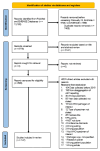Progress on implementing the WHO-GLASS recommendations on priority pathogen-antibiotic sensitivity testing in Africa: A scoping review
- PMID: 39931110
- PMCID: PMC11809157
- DOI: 10.12688/wellcomeopenres.23133.1
Progress on implementing the WHO-GLASS recommendations on priority pathogen-antibiotic sensitivity testing in Africa: A scoping review
Abstract
Introduction: The World Health Organization global antimicrobial resistance surveillance system (GLASS) was rolled out in 2015 to guide antimicrobial resistance (AMR) surveillance. However, its implementation in Africa has not been fully evaluated. We conducted a scoping review to establish the progress of implementing the WHO 2015 GLASS manual in Africa.
Methods: We used MeSH terms to comprehensively search electronic databases (MEDLINE and Embase) for articles from Africa published in English between January 2016 and December 2023. The Arksey and O'Malley's methodological framework for scoping reviews was employed. Data were collected on compliance with WHO GLASS recommendations for AMR surveillance-priority samples, pathogens, and pathogen-antibiotic combinations and analysed using Microsoft Excel.
Results: Overall, 13,185 articles were identified. 7,409 were duplicates, and 5,141 articles were excluded based on titles and abstracts. 609 full-text articles were reviewed, and 147 were selected for data extraction. Of the 147 selected articles, 78.9% had been published between 2020 and 2023; 57.8% were from Eastern Africa. 93.9% of articles were on cross-sectional studies. 96.6% included only one priority sample type; blood (n=56), urine (n=64), and stool (n=22). Of the 60 articles that focused on blood as a priority sample type, 71.7%, 68.3%, 68.3%, 36.7%, 30%, and 10% reported recovery of Escherichia coli, Staphylococcus aureus, Klebsiella pneumoniae, Acinetobacter baumannii, Salmonella species and Streptococcus pneumoniae, respectively. Salmonella and Shigella species were reported to have been recovered from 91.3% and 73.9% of the 23 articles that focused on stool. E. coli and K. pneumoniae recoveries were also reported from 94.2% and 68.1% of the 69 articles that focused on urine. No article in this review reported having tested all the recommended WHO GLASS pathogen-antibiotic combinations for specific pathogens.
Conclusion: Progress has been made in implementing the GLASS recommendations in Africa, but adoption varies across countries limiting standardisation and comparability of data.
Keywords: Antimicrobial resistance; GLASS implementation; AMR Surveillance; Africa.
Plain language summary
Introduction: Antimicrobial resistance (AMR) is a growing problem globally, and it's particularly serious in Africa. To address this, the World Health Organization (WHO) created the Global Antimicrobial Resistance Surveillance System (GLASS). This study aimed to see how well African countries are following the GLASS guidelines.
Methods: We looked at research papers published between 2016 and 2023 that collected data on AMR in Africa. We focused on studies that followed the GLASS guidelines and reported data on specific types of infections and bacteria.
Results: We found that many African countries have made progress in implementing GLASS, but there are still gaps. Some countries are not reporting data on all the recommended infections and bacteria. Also, the quality of the data can be inconsistent.
Discussion: The findings of this review highlight the progress made in implementing GLASS in Africa, but also identify significant gaps in the data collected and reported. The inconsistencies in pathogen-antibiotic combinations may be due to factors such as limited laboratory resources, lack of standardized methods, and variations in national guidelines.Addressing these gaps is essential for improving the quality of AMR surveillance in Africa through investing in national AMR surveillance systems, developing standardized methods, and training laboratory staff. Collaboration between countries and international organisations is crucial for sharing data and best practices.
Conclusion: While progress has been made, there is still work to be done to improve AMR surveillance in Africa. By addressing the gaps identified in this study, countries can better understand the extent of AMR and develop effective strategies to combat it.
Copyright: © 2024 Hope M et al.
Conflict of interest statement
No competing interests were disclosed.
Figures
References
-
- O’Neill J: Antimicrobial Resistance: tackling a crisis for the health and wealth of nations. Review on Antimicrobial Resistance. 2014;2014(4). Reference Source
-
- World Health Organization: Global action plan on Antimicrobial Resistance.2015. Reference Source - PubMed
-
- World Health Organization: Antimicrobial Resistance: global report on surveillance.World Health Organization,2014. Reference Source
Publication types
Grants and funding
LinkOut - more resources
Full Text Sources


